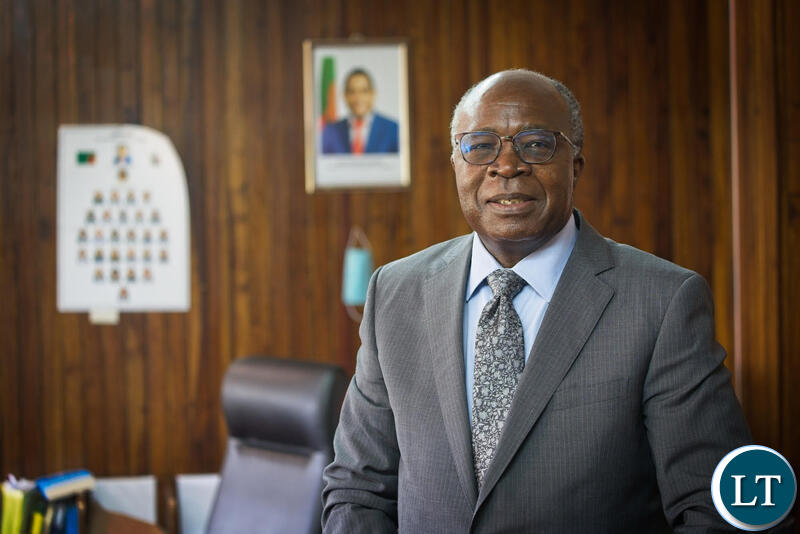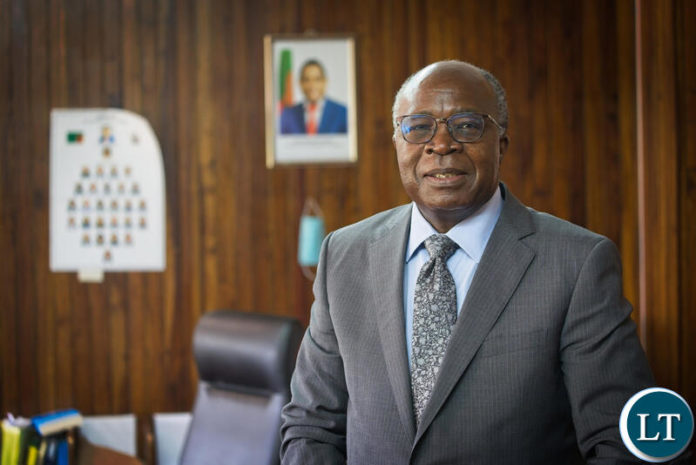
Finance Minister Situmbeko Musokotwane has said the 100 million dollars that the World Bank will provide to Zambia under the National Energy Advancement and Transformation- NEAT- programme will deliver an immediate financial boost to ZESCO.
Dr. Musokotwane said the approval of the NEAT programme will also support the procurement process for non hydropower renewable at the critical time when Zambia is experiencing an extensive drought.
Dr. Musokotwane said the -NEAT- programme will also support the implementation of the 10 year turnaround strategy and business plan that aims to return the ZESCO to financial sustainability and profitability.
He said the programme which has committed 700 million dollars over the next 10 years will also cater for rural electrification strategic plans and the energy sector integrated resource plan.
Dr. Musokotwane further said the programme will further augment Government’s efforts in enhancing reliability and climate resilience of the electricity sector by supporting implementation of the ZESCO strategy for improved customer management, reliability of supply and system resilience to climate change .
The National Energy Advancement and Transformation Program (NEAT), a multiphase program supported by the World Bank, will help Zambia step up the financial sustainability, reliability, and resilience of its electricity sector by 2033.
The $700 million NEAT program will help Zambia’s national power utility, ZESCO, return to sustainability, attract new private sector investment at scale to enable new growth, and deliver more inclusive development across the national territory. In doing so, it will also help to enhance the energy sector’s climate resilience through diversification of the energy mix.
The first phase of the program, which runs from 2024 to 2026, will provide a $100 million grant to improve ZESCO’s financial performance and operational reliability, and strengthen electrification financing mechanisms supporting the Rural Electrification Authority (REA). It will also improve Zambia’s procurement process for non-hydropower renewable energy projects.
“This International Development Association (IDA) grant represents an important step towards supporting Zambia to secure a sustainable and resilient energy future for its people. We are hopeful that by addressing the immediate financial challenges and laying the groundwork for a diversified energy portfolio, we are setting the stage for long-term economic growth,” said Achim Fock, World Bank Country Manager for Zambia.
The NEAT program will facilitate the implementation of the government’s recently launched Integrated Resource Plan and is underpinned by ZESCO’s and REA’s own multi-year strategic plans.
“The deliberate focus on increasing renewable energy capacity by a substantial 1,458 megawatts demonstrates the World Bank’s commitment to supporting Zambia to diversify its energy sources and enhance climate resilience,” said Yadviga Semikolenova, World Bank Practice Manager for Energy in Eastern and Southern Africa.
The NEAT program demonstrates the World Bank’s commitment to supporting Zambia’s energy policies contained in the 8th National Development Plan (8NDP), Vision 2030, and National Energy Policy (NEP). The program also aligns with the World Bank’s goals of ending extreme poverty and boosting prosperity on a livable planet by enabling access to reliable and sustainable energy sources.
Early this month President Hakainde Hichilema officially declared the prolonged dry spells in Zambia as a National Disaster and Emergency, citing the devastating impact of the El Niño weather phenomenon on the country’s agriculture, water availability, and energy supply.
The declaration, made in accordance with the disaster management act, underscored the severity of the situation, with millions of Zambians at risk of food insecurity and livelihood disruption. President Hichilema has outlined short-term measures including humanitarian relief efforts, importing food and electricity, and promoting alternative energy sources, alongside long-term strategies focusing on water harvesting and irrigation development to stimulate agricultural production. President Hichilema indicated that the government would realign the 2024 national budget to achieve the targeted measures.
Meanwhile Zambia’s power utility, ZESCO, is navigating negotiations with Mozambique to secure an additional 120 Mega Watts of power in response to the nation’s electricity deficit. Energy Minister Peter Kapala revealed this initiative during a parliamentary session addressing Zambia’s energy challenges.
ZESCO plans to withdraw 120 Mega Watts from the export market, aligning with existing bilateral contracts, to bolster domestic supply amidst the crisis. Additionally, ongoing negotiations between ZESCO and Ndola Energy Company Limited aim to resume operations at a 105 Mega Watt power plant by April 2024.
The government emphasized strategic institutions’ uninterrupted operation during load shedding, prioritizing entities like health facilities, water utilities, and industries. While ZESCO initiates load shedding to mitigate reservoir depletion, it anticipates monthly revenue losses of approximately $35 million. Long-term strategies outlined include renewable energy expansion projects and the completion of the Integrated Resource Plan (IRP) to sustainably address Zambia’s energy needs.
ZESCO commenced 8-hour daily load shedding on Monday, March 11, 2024. The decision followed a meticulous assessment of water levels in the Kafue and Zambezi basins.
For more information: World Bank



Most of us here, including Pilato can’t understand a bit about the above sh!t! So why use precious phone batteries reading the crap?
What time is load shedding tomorrow, so people can charge phones in advance.
The statement should have said “The $100m that the World Bank will loan Zambia”. So the World Bank has not yet released this loan, just like the IMF when HH has already removed subsidies, increased fuel, reduced FISP as prescribed by IMF. What is the lead time for Zesco to start generating renewed energy because load shedding is already upon the poor Zambians. This Kaleya Mateo of IMF will continue until Zambians think otherwise in 2026. HH went further and sold the Maize reserves that previous governments was keeping for times like this. With this incompetence in government, Zambians should bless themselves for misery ahead. Come 2025, Zambians will be sharing a bag of mealie meal like the way they are doing with fertilizer. Promises even when they are already in government.
So you did read this “The first phase of the program, which runs from 2024 to 2026, will provide a $100 million grant to improve ZESCO’s financial performance and operational reliability,” yet you still managed to come up with a comment like that which got several thumbs up? We have a comprehension problem.
Why are we speaking about constructing electricity capacity when we have already the installed capacity and we are exporting it to SA through agreements made in the dark corners. furthermore this leadership does not know that renewables are limited in terms of how much can be installed on the grid. Why should an economy rich in minerals be getting handouts from World Bank and at the same time giving rebates to the mines? Novices
What a joke of Government….Begger mentality is a curse…..
So these governance novices have equally run down the ZESCO coffers right?
When will you stop borrowing, until Jesus comes?
Jesus’ coming=infinity
I asked my friend where HH was going to get money from to reduce the prices of essential commodities. He told me that HH was a dollar billionaire and was going to use his money for this ( price reduction)
I’m still waiting for that money. Meanwhile my friend is district chairman in one of the copperbelt towns
That you would even wait for the money that your friend told you about as a pathway to reduction of prices of essential commodities is very sad. There is no easy way out of the mess we are in. No Blesser behind the corner waiting to bail us out. Nada – not going to happen. Our mentality needs to change as Zambians. We only get out of this through persistent, hard work , strategic thinking and investment and concentrating on the right priorities. The sooner we come to terms with this and raise the calibre of our discourse and engagement, the better.
Makunku
That is the problem we are facing as a nation………
Some people are waiting on or expect handouts , brown envelopes, slush funds and corruptly obtained wealth….
Your friend is an idiot of nore
Sorry meant an 1d10t of note
@Tikki and still remains.
How come so many Zambian politicians have a Dr.in front of their names…Dr. of what??
“ZESCO plans to withdraw 120 Mega Watts from the export market”. UPND has been expoerting electricity using murky and nontransparent agreements. In the meantime Zambians are losing jobs and the economic cost of not having electricity is more than any funds Zecso will earn. All electricity exports should stop immediately! Bible says: “First let the children eat all they want,” he told her, “for it is not right to take the children’s bread and toss it to the dogs.” Mark 7: 24-29
Once we get rid of corruption and wastage of our natural resources then we will have enough money to develop our country but for as long as we pin our hopes on IMF and World Bank then forget it….we will always be moving in reverse
@Makunku you must be a very dull person not to comprehend the gist of my post.
Of course you diehard party followers always have a way of saving face.
KK tried to go local but we rose against him… Actually we deserve the sh”***t we are going through.
?
Zesco really doesn’t need recapitalization. Zesco makes a lot of money but the only problem is the expenses are just too much especially with regard to top heavy and middle management getting extremely high salaries and allowances coupled with politicians also siphoning from there whenever they are short for a by election or other expenses. This makes the expense exceed income which leads to shortfalls in capital so zesco cannot expand or maintain their network and have to beg from world bank to fulfill their obligations.
A so-called energy expert was heard shouting that electricity exports must continue alongside local power shedding. Why must we sacrifice for others? Is Zesco not by Zambians and for Zambians? A few employwd locals are heavily taxed, while multinational firms are tax exempt. When will Zambia be for Zambians? Do you even borrow fr Zambians?
Comments are closed.